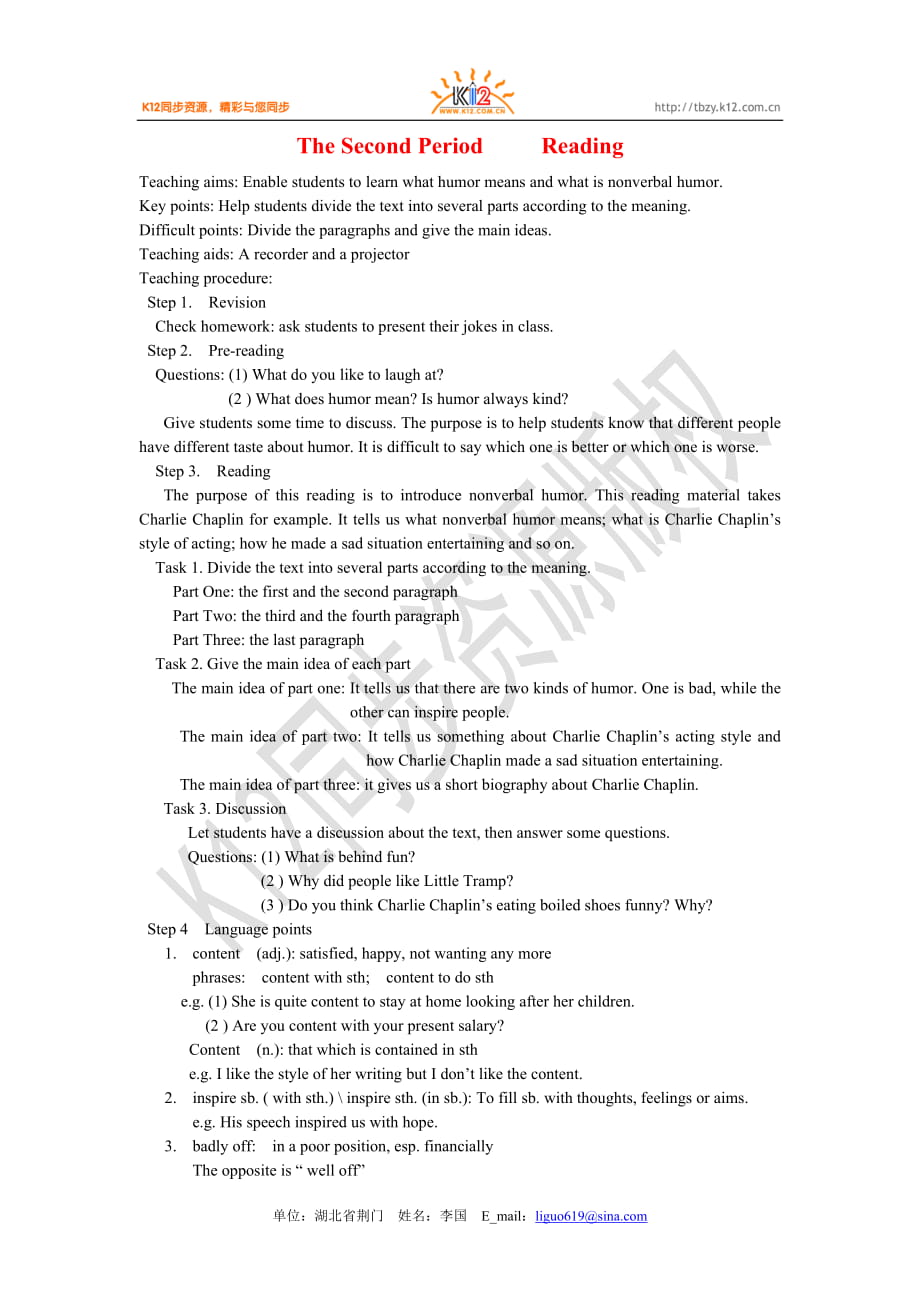《高一英語(yǔ)(下)必修四Unit 3 課時(shí)教案The Second Period》由會(huì)員分享��,可在線閱讀���,更多相關(guān)《高一英語(yǔ)(下)必修四Unit 3 課時(shí)教案The Second Period(2頁(yè)珍藏版)》請(qǐng)?jiān)谘b配圖網(wǎng)上搜索��。
1���、
The Second Period Reading
Teaching aims: Enable students to learn what humor means and what is nonverbal humor.
Key points: Help students divide the text into several parts according to the meaning.
Difficult points: Divide the paragraphs and give the main ideas.
Teaching aids: A recorder
2、and a projector
Teaching procedure:
Step 1. Revision
Check homework: ask students to present their jokes in class.
Step 2. Pre-reading
Questions: (1) What do you like to laugh at?
(2 ) What does humor mean? Is humor always kind?
Give students some time to discuss. The pu
3�����、rpose is to help students know that different people have different taste about humor. It is difficult to say which one is better or which one is worse.
Step 3. Reading
The purpose of this reading is to introduce nonverbal humor. This reading material takes Charlie Chaplin for example. It te
4��、lls us what nonverbal humor means; what is Charlie Chaplin’s style of acting; how he made a sad situation entertaining and so on.
Task 1. Divide the text into several parts according to the meaning.
Part One: the first and the second paragraph
Part Two: the third and the fourth paragraph
Part
5�、Three: the last paragraph
Task 2. Give the main idea of each part
The main idea of part one: It tells us that there are two kinds of humor. One is bad, while the other can inspire people.
The main idea of part two: It tells us something about Charlie Chaplin’s acting style and how Cha
6、rlie Chaplin made a sad situation entertaining.
The main idea of part three: it gives us a short biography about Charlie Chaplin.
Task 3. Discussion
Let students have a discussion about the text, then answer some questions.
Questions: (1) What is behind fun?
(
7�����、2 ) Why did people like Little Tramp?
(3 ) Do you think Charlie Chaplin’s eating boiled shoes funny? Why?
Step 4 Language points
1. content (adj.): satisfied, happy, not wanting any more
phrases: content with sth; content to do sth
e.g. (1) She is quite content to stay at h
8����、ome looking after her children.
(2 ) Are you content with your present salary?
Content (n.): that which is contained in sth
e.g. I like the style of her writing but I don’t like the content.
2. inspire sb. ( with sth.) \ inspire sth. (in sb.): To fill sb. with thoughts, feelings or aims.
9、e.g. His speech inspired us with hope.
3. badly off: in a poor position, esp. financially
The opposite is “ well off”
e.g. (1) They are too badly off to have a holiday.
(2 ) In fact most people are better off than they were five years ago.
Step 5 Practice
Finish the exercises on
10����、 page 18, 19, it is a good time to consolidate the whole content of the text and the useful words and expressions from the text. It is easy for most students to finish. So leave students several minutes to finish and check the answers by showing them on the screen.
Step 6 Homework
Preview grammar by finishing Exercises 3, 4 on page 20, all the exercises on page 21.
單位:湖北省荊門 姓名:李國(guó) E_mail:liguo619@
 高一英語(yǔ)(下)必修四Unit 3 課時(shí)教案The Second Period
高一英語(yǔ)(下)必修四Unit 3 課時(shí)教案The Second Period

